FASS-Food EU organized and coordinated in 4 workshops with Brussels-based organizations and institutions. In addition, it has contributed to the organization of local workshops led by the pilot cases.
The Brussels-based events were participatory workshops aimed at seeking input from the selected participants on the state of affairs of EU policies than are either incentivising or preventing the uptake of bottom-up “Fair, Accessible, Sustainable and Short (FASS) Food systems” in the EU. Through a structured dialogue among participants we established what can be catalogued as enablers, blockers and lock-ins in EU policies that incentivise or prevent sustainable food systems as well as discuss whether there is or not an enabling environment for bottom up EU initiatives for sustainable food systems, from a farmer perspective.
1. Workshop on Local Fair Trade initiatives in Europe (27 May 2021)
This workshop was organized in collaboration with the Trade for Development Centre (ENABEL) and Fair Trade Advocacy Office (FTAO), in cooperation with the FASS-food project team (Univ. of Antwerp, FTAO, WFTO-Europe). The objective was to share information on Localising Fair Trade pilots in Europe and identifying essential elements that all share as well as differences between them. Within this context, ENABEL firstly presented an overview of Local Fair Trade initiatives in Belgium and Europe. Subsequently, on-the-ground experiences were presented by presentations from Solidale Italiano (Italy), Syn Alys (Greece) and Commerce Équitable France (France). BAsed on these inputs, workshop participants collectively worked on common elements of Local Fair Trade initiatives in Europe with a main focus on pilot projects in North-North relations.
Find here the Agenda.
Find FASS-Food EU presentation presentation here.
2. FASS-Food event on EU policy blockers and enablers (15 June 2021)
This was a participatory workshop aimed at seeking inputs from the selected participants on the state of affairs of EU policies that are either incentivising or preventing the uptake of bottom-up “Fair, Accessible, Sustainable and Short (FASS) Food systems” in the EU. Through a structured dialogue among participants we established what can be cataloged as enablers and blockers in EU policies that incentivise or prevent sustainable food systems. We also discussed whether there is or not an enabling environment for bottom up EU initiatives for sustainable food systems, from a farmer perspective. Details about blockers and enblers are provided below.
Find here the Agenda.
Find here the FASS-Food EU presentation prepared for the event.
3. FASS-Food workshop on enablers (06 October 2021)
The workshop involved a small group of civil society, NGOs, farmer groups, academics, policy-makers, FASS-Food partners and Fair Trade movement actors. Its main objective was to understand what the role of EU policies towards FASS Food systems is, and what their objectives should be. For that, the workshop dived deeper in previous discussions on blockers. Based on the outcomes of the previous discussions, a structured dialogue was implemented with participants based on the following guiding questions: to what extent EU policy creates the problem and to what extent they block the solution? What are the problem policies? Why are the EU policies not changing fast enough? What are the problems that maintain the status quo of EU policies hampering or not promoting FASS Food systems? What else can the EU do to change the situation? Based on the answers received during this workshop several blockers have been identified at different levels of the supply chains (see image below).
Find here the Agenda.
Find here a summary of the policy blockers:
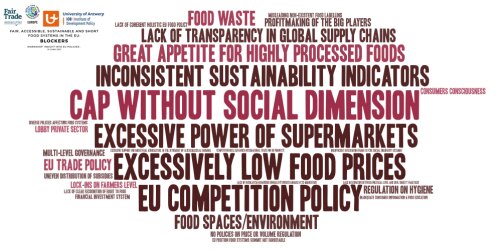
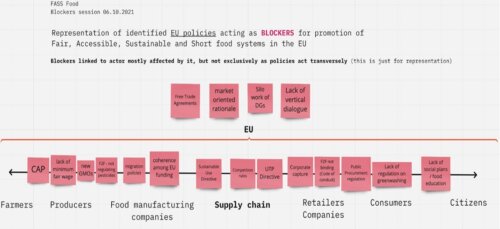
4. FASS-Food workshop on Blockers (09 November 2021)
The workshop involved small groups of civil society, NGOs, farmer groups, academics, policy-makers, FASS-Food partners and Fair Trade movement actors. Its main objective was to understand what the role of EU policies towards FASS-Food systems is, and what their objectives should be. For that, the workshop dived deeper in previous discussions on enablers.
Find the Agenda here.
Find here a summary of the Policy Enablers:
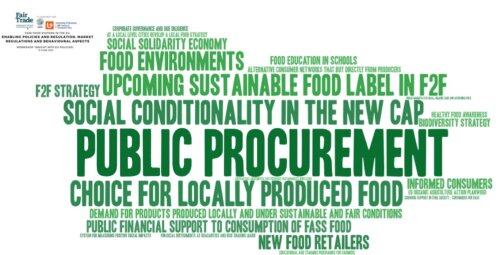
5. Local FASS-Food workshop organized by Syn Allois (Athens, 28 May 2022)
On 28/05/2022, Syn Allois members organised in Athens the workshop entitled “The Food Route through Alternative Networks”. This was the occasion to gather different agri-food producers/processors and cooperative grocery stores that are part of Syn Allois’ ecosystem, and an opportunity to develop a common vision about the work they perform in Greece. The workshop consisted of different sessions, within each of which different questions were answered by participants.
Session 1 – The cooperation framework of ecosystem actors:
- How and in what ways does working with a cooperative grocery store help a producer/processor?
- Why do cooperative grocers choose to work directly with producers/processors? What criteria are used to make the selection?
- What do we (producers, processors, and cooperative grocers) seek from our collaboration? What kind of relationships do we want to build?
- What kind of information do we want/need to communicate to consumers and in what ways?
Session 2 – Evaluation and improvement of cooperation among ecosystem actors:
- How do we evaluate our collaboration up to now? What works well? What kinds of problems exist?
- What do cooperative grocers know about the practices followed by producers/processors and vice versa?
- In what ways can we improve and deepen our cooperation?
Through answers to these questions Syn Allois and its ecosystem members realized that cooperatives are important legal and organizational devices to organize local farmers. These structures often have a positive impact on society, allowing farmers and producers to take care of the food products they trade as well as of their community, by offering good working conditions, respecting the environment, providing quality products, and in general by promoting ethics in business. Key problems for all ecosystem members are due to the periodicity of organic products, which might lead to shortages in vegetables and fruits availability: this negatively impact the businesses as it often drives away customers, who are used to always find everything. Strengthening the ecosystem network is important to overcome shortage problems as members of the ecosystem can mutualize availability of products in order to facilitate the regulation of consumers’ demand and local farmers’ supply relationships. Producers and grocery cooperatives operating under the same mutualization scheme could adopt a common label that would make them recognizable as one single actor in the eyes of consumers.
More details about the answers provided by workshop participants can be found here.
6. Local FASS-Food workshop organized by CTM-AgroFair (Padua, 29 October 2022)
This workshop, entitled “Gathering with the producers”, intended to share the FASS-Food EU findings with all Italian actors involved in the project, as well as to create a space of meeting and exchange between the various producers who with their work allow the realization of Solidale Italiano’s initiative. The idea was thus to also stimulate peer-to-peer discussion and comparisons as a basis from which new ideas and solutions can arise to overcome obstacles and favor the development of FASS-food chain models. The discussion following the presentations centered on the different strategies adopted by the producers and the factors influencing the viability of their projects.
After the presentation and discussion, the participants had the opportunity to visit the Social Agricultural Cooperative “Caresà”, which hosted the event, having an overview and exchanging on the infrastructures and practices they have developed through the years.
Read here the presentation of FASS-Food EU and of the producers’ cooperatives partnering Solidale Italiano (Language: Italian)
7. Final FASS-Food event (Brussels, 26 September 2022)
The objective of this event has been to gather relevant stakeholders and establish a dialogue on common concerns, points of friction and where opportunities at EU level at present to promote fair, accessible, sustainable, and short food supply chains in the EU. It was the opportunity to bring together the bottom up and top-down perspectives, hearing the challenges faced in the ground and putting them at the centre of our demands in terms of EU policies and regulations.
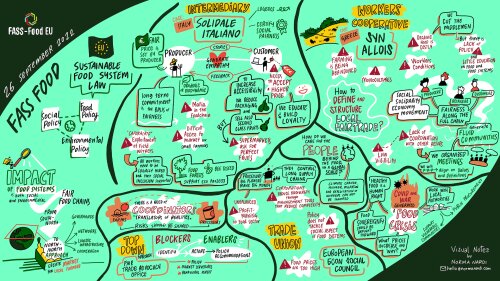
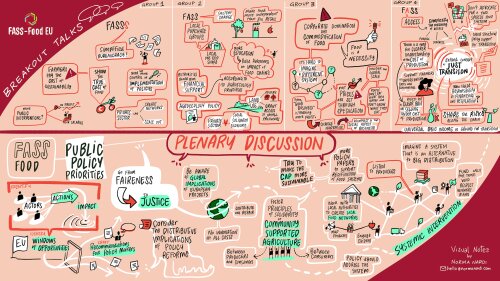
Key recommendations that have emerged from the bottom-up research are the following and relate to the 4 different FASS dimensions:
- Fair – Promote food councils: building community-based multistakeholder spaces (farmers’ organizations, interested consumers, restaurants and groceries, schools and universities…), public authorities can foster the identification of local issues and best practices, as well as the vertical and horizontal coordination of food system actors, thus enhancing the relevancy and adequacy of the policy-making process and synergizing actions on food environmental and social justice.
- Accessible – Set up food welfare policies: information campaigns and more transparency alone may not trigger increased sustainable consumption, especially for those lacking the means to pay higher prices. Public programs that support families and individuals’ food purchasing power are fundamental to ensure the right to food and the universal access of the EU population to healthy and nutritious food that meets their dietary needs and preferences, parallelly bolstering sustainable agricultural practices and fair incomes for producers.
- Short – Implement local urban/rural food policies: various actions, such as (a) the implementation of local initiatives promoting transparency and information on food, nutrition, and environment, (b) the creation of financial support or expertise advise schemes to kick-off and consolidate sustainable local food chains, (c) the re-establishment of dismantled local-scale networks of food facilities and infrastructure (small-scale mills, slaughterhouses, canning factories, etc.), can improve the valorization and the outlets of local food products, as well as reduce food waste.
- Sustainable – Transform public procurement into an actual leverage of change: by being required to apply mandatory socially and ecologically responsible criteria for public procurement (not just the lowest bid nor voluntary guidelines), public authorities can shape markets and consumers’ choices. For example, they can support agroecological farming practices, ensure fair incomes and working conditions, favor social and professional inclusion, and increase the access of citizens to healthy food. Best practices exist around the EU and they can be replicated, scaled up and institutionalized.
More details about the event and the bottom-up policy recommendations can be found here.